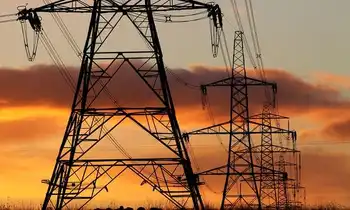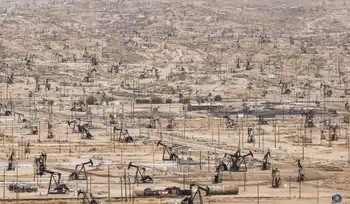Winners and losers emerge from energy bill
By Associated Press
CSA Z462 Arc Flash Training - Electrical Safety Essentials
Our customized live online or in‑person group training can be delivered to your staff at your location.

- Live Online
- 6 hours Instructor-led
- Group Training Available
The House narrowly passed landmark legislation meant to curb greenhouse gas emissions and create an energy-efficient economy, voting 219-212. President Barack Obama urged senators to follow suit.
Everyone from small farmers to nuclear energy companies would be forced to re-evaluate their place in the new order. Power plants, factories and refineries would feel the first impact if the federal government moves ahead with plans to cut greenhouse gas emissions by 17 percent from 2005 levels by 2020 and by about 80 percent near the end of the century.
The sharply debated bill's fate is unclear in the Senate. A major struggle is expected with 60 votes needed to overcome a certain Republican filibuster.
How much it will affect other industries is still a matter of intense debate, though the primary winners and losers are already emerging.
The Winners:
Solar, wind, geothermal and other renewable energy companies, including nuclear, are some of the obvious winners in a carbon economy.
In addition to the billions of federal stimulus dollars they expect to receive, those industries can expect to see a huge boost in investment as utilities and power companies are forced to cut their carbon emissions. Companies like Florida Power & Light Co., Arizona Public Service, Southern California Edison and others are already investing in solar farms and other renewable energy projects, and they'll likely spend even more to increase the mix of carbon-neutral energy sources.
Farmers also will find new ways to make money in a carbon economy. Carbon consultants like the International Carbon Bank & Exchange in Florida see huge potential in agriculture for managing carbon emissions. Farmers that till their soil differently or apply new environmental techniques can get money by cooperating with a polluter as a carbon "offset."
Owners of large tracts of forest land also will get a lot of interest from the business community. Like farmers, environmental experts see them as a huge player in the carbon economy because of their natural ability to absorb carbon.
Louis Blumberg, director of climate change for the Nature Conservancy's California chapter, envisions a system in which forest owners could make money simply by signing an agreement to cut down fewer trees for lumber.
The Nature Conservancy did just that last year with the Conservation Fund, a nonprofit agency that owns about 24,000 acres of redwood and douglas fir forest northwest of San Francisco. The groups changed the logging schedule on the property, and the fund expects to receive about $2 million from Pacific Gas and Electric, which participates in a regional climate initiative similar to the one that the Waxman-Markey bill would create around the country.
"This is really a model of what can happen," Blumberg said. "Property owners everywhere want to figure out a way to be part of this."
The Losers:
Anyone who pays an electric bill would likely feel the impact of climate legislation. Utilities will try to raise rates as they invest in cleaner-yet-more-expensive energy sources. Some have already announced plans to do so. Petroleum companies also may try to import more of their refined gas and heating oil from countries with no carbon law, which will raise costs.
The nonpartisan Congressional Budget Office and the Environmental Protection Agency both issued estimates of how the climate bill would affect energy costs.
The CBO estimated the cost at $175 a year for the average household. The EPA forecasts $80 to $110 a year.
The American Petroleum Institute disputed both estimates, saying the bill could cost the average household up to $3,300 by 2020.
"That is more than a few postage stamps," API President Jack Gerard said in a slap at Rep. Edward Markey, D-Mass. Markey has compared new energy costs to a postage stamp per day.
API has tried to paint the bill as a job killer that would choke off efforts to pull the economy out of recession.
"While we support creating new jobs, the legislation offers an unnecessary and false choice of eliminating good jobs in the oil and natural gas industry to create green jobs," Gerard said.
Oil and gas companies have spent record amounts of money lobbying Congress recently as they try to blunt the impact of the bill.
Refiners, in particular, say the inherent costs in the legislation could shift some fuel production outside the U.S., where refiners would not be bound by its provisions.
The National Petrochemical & Refiners Association also says the legislation hurts them two different ways, by capping emissions from refineries as well as emissions from the fuels they produce. But refiners say they are not recieving enough credits.
The association says the legislation could cost U.S. refiners as much as $58 billion a year.
Coal miners also are worried because it might cut into demand for coal, which is loaded with carbon. Mining also uses a lot of energy, so the rise in energy costs would hurt their bottom line.
The country gets about half of its electricity from coal. Some utilities that rely on coal to generate much of their electricity worried about initial versions of the legislation that they said would lead to skyrocketing rates. The current version will mean much smaller increases, they said.
Columbus, Ohio-based American Electric Power said the legislation will send rates about 25 percent higher by 2015; the initial version would have meant rate hikes of 65 percent to 75 percent.
Another big utility that relies on coal, Charlotte, N.C.-based Duke Energy, said the legislation creates regulatory certainty for an industry that spends billions on capital expenditures annually. If Congress does not act, the U.S. Environmental Protection Agency will after the U.S. Supreme Court gave the agency authority to regulate emissions under the Clean Air Act, Jim Rogers, Duke's chairman, president and CEO, said in a letter to U.S. Rep. James Clyburn obtained by The Associated Press.
"While the EPA may have the technical expertise to create environmentally sound regulations, it lacks the explicit legislative authority to craft an environmentally sound program that minimizes costs to consumers and our economy," the letter said. "So leaving the EPA with the responsibility to develop and implement a program that will touch every aspect of our daily lives is neither appropriate nor in the best interest of our nation."
Rogers said the initial legislation would have required consumers in states where fossil fuels make up the majority of electric generation to pay double — first to purchase the allowances to keep current generation operational and then for investments in low-carbon technology.
Wayne Leonard, chairman and president of New Orleans-based Entergy, said his company is looking at its alternatives such as biomass and expanding production from its nuclear plants to cut emissions.











